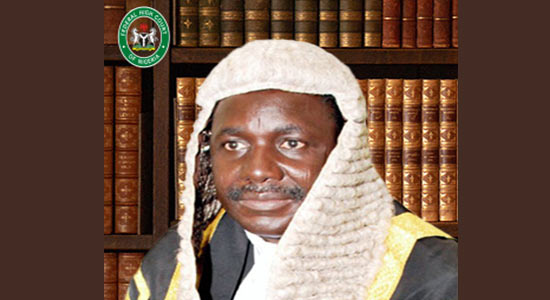The corridors of Nigeria’s political establishment are once again gripped by rumors, whispers, and anxious speculations about the future of the country’s fragile democracy. At the center of the storm is a name that only a few Nigerians outside legal and political circles had paid much attention to until recently: Justice Abdullahi Mohammed Liman, a retired Court of Appeal judge from Nasarawa State.
Over the past several weeks, conversations in Abuja’s power enclaves have increasingly revolved around the possibility that President Bola Ahmed Tinubu is considering Justice Liman to succeed Professor Mahmood Yakubu as the chairman of the Independent National Electoral Commission (INEC). Though there has been no official confirmation, the idea alone has already triggered waves of apprehension, speculation, and accusations of calculated political maneuvering.
What makes the speculation even more combustible is Liman’s reputation. He is not an obscure figure in the judiciary; rather, he has been at the heart of some of Nigeria’s most controversial legal battles over the last decade. To many, his judicial career has become synonymous with contentious rulings, allegations of political partisanship, and entrenched alliances with influential power brokers. To others, he is simply a seasoned jurist unfairly cast in the shadows of Nigeria’s volatile political rivalries.
Yet, in Nigeria, where elections often serve as battlegrounds rather than mere democratic exercises, the appointment of an electoral umpire is never just an administrative formality. It is a profoundly political act, one capable of shaping not just the outcome of the next election but the credibility of the democratic process itself. This is why whispers about Liman are already setting off alarm bells across the political spectrum.
The Origins of the Rumor
The first serious suggestion that Justice Liman might become INEC chairman came in the form of a casual remark from a well-connected insider in Abuja’s political circles. He mentioned to a journalist friend that Tinubu was seriously considering Liman as Mahmood Yakubu’s successor. The journalist, somewhat embarrassed, admitted he had never paid much attention to the judge, largely because reporters in Nigeria’s judicial beat tend to focus on rulings rather than the personalities behind them.
But soon after, the rumor picked up momentum. Social media became awash with lists of past INEC chairmen dating back to 1964, highlighting regional patterns in the appointments. Amplified by Tinubu’s supporters, these lists were used to argue that the South-South region had dominated the position for much of Nigeria’s history, while the Southwest — Tinubu’s own region — had never produced an electoral commission chairman.
Observers noted that this was not accidental. The dissemination of such lists seemed carefully choreographed to prepare the ground for a possible Southwest appointment, so that Tinubu could deflect charges of ethnic favoritism if he eventually named someone from his own Yoruba heartland. Yet, intriguingly, others pointed out that no one from the North-Central region, where Liman hails from, has ever been appointed either. That fact alone suggested that Tinubu might use a Liman appointment to score points about inclusivity while still keeping a trusted figure close to his political orbit.
The Shadow of Buba Galadima
The speculation might have remained confined to rumor mills were it not for the intervention of veteran politician Buba Galadima, who during a September 16 interview with Arise TV, made cryptic references to a “just retired Court of Appeal judge” rumored to be Tinubu’s pick for INEC chairman.
“Come November, there are rumors all over the place that this government is nominating a just retired court of appeals judge who is known for notoriety to be the chairman of INEC,” Galadima declared, his voice heavy with foreboding. “I wish it is not true. Because if that man becomes the chairman of INEC, be rest assured that this government is inviting a civil war in this country.”
Though he never mentioned Liman by name, every clue in his statement seemed to point in his direction. Liman had just taken early retirement, despite the retirement age for judges having been raised to 70. He was indeed a magnet for controversy. And the rumor had already been circulating in elite circles.
Civil war might be hyperbole, but Galadima’s warning underscored the stakes involved. If Nigerians have learned anything from past elections, it is that the perception of fairness is almost as important as the actual conduct of the vote. An INEC chairman seen as politically compromised could plunge the nation into chaos even before ballots are cast.
Liman’s Controversial Track Record
To understand why Liman’s possible appointment is being met with alarm, one only has to look at his record. A May 2024 Daily Trust analysis titled “Kano Emirate: 7 Controversies Trailing Justice Liman” painted a picture of a jurist never far from the storm.
One of the most contentious cases was his intervention in the Kano emirate crisis, when he halted Governor Abba Yusuf’s move to reinstate former Emir Sanusi Lamido Sanusi. The ruling triggered a palace standoff, inflamed political passions, and raised complex jurisdictional debates.
Liman was also at the center of decisions that shielded Abdullahi Ganduje, the former governor of Kano State and a close ally of Tinubu. He halted Ganduje’s suspension as APC chairman and blocked his arrest over the infamous “dollar stuffing” video scandal. Critics argue these rulings show Liman’s proximity to Ganduje and, by extension, to Tinubu’s political machinery.
In Edo State, Liman faced accusations of misconduct and dereliction of duty after governorship candidate Peters Omoragbon complained about delays in ruling on an INEC-related case. In Port Harcourt, his home was one of those raided by the Department of State Services (DSS) in 2016, during which agents claimed to have recovered $2 million. Liman dismissed the allegation with characteristic sharpness, quipping that if he had that much money, he would have resigned from the bench.
Perhaps most infamously, his 2015 sentencing in the N25 billion corruption trial of Michael Igbinedion caused public outrage. While one defendant walked away with light fines, his co-defendant was slammed with a 20-year sentence. Critics called the judgment a miscarriage of justice, while defenders insisted he had simply followed the letter of the law.
These episodes, when stitched together, create a portrait of a judge whose career has been repeatedly shadowed by controversy. Whether by coincidence or design, Liman has always seemed to find himself in the crosshairs of Nigeria’s most politically sensitive cases.
Tinubu’s Calculations
Why, then, would President Tinubu even consider him? To some insiders, the logic is simple. Tinubu’s political future hinges on 2027. He will need an electoral umpire he can trust — someone capable of navigating Nigeria’s notoriously turbulent electoral waters while also ensuring outcomes favorable to his ambitions.
Appointing a Northerner, particularly from the North-Central, offers Tinubu a shield against accusations of regional bias. Yet if that Northerner happens to be someone with strong ties to Ganduje and other allies in Tinubu’s camp, so much the better.
The move would not be without precedent. Nigeria’s history of INEC chairmanship has often been colored by quiet calculations of loyalty, balance, and expedience. Still, the risk lies in perception. If Nigerians widely believe the electoral umpire is compromised before even taking office, the credibility of the 2027 elections could be fatally undermined.
The Larger Political Implications
Nigeria is no stranger to electoral controversies. From the annulled June 12, 1993, election to the disputed 2007 polls and beyond, the nation’s democratic history is littered with examples of flawed processes that left deep scars. Yet, what has often saved the system from complete collapse is the fragile belief — however faint — that institutions like INEC can rise above partisan manipulation.
If Liman is indeed Tinubu’s choice, that fragile belief may face its sternest test yet. Already, Galadima’s remarks suggest that powerful actors are prepared to frame the appointment as evidence of a broader conspiracy to rig the system. In a country where trust in institutions is already at a historic low, this could inflame tensions in ways that are difficult to predict.
There is also the question of Liman’s early retirement. Was it a coincidence? Or was it timed to prepare him for the INEC job? The judiciary is typically cautious, and few judges willingly step aside early unless they are eyeing other opportunities. This detail alone has fueled speculation that the rumor is not without substance.
The Path Ahead
As of now, nothing is official. Tinubu has not made any public announcement, and INEC continues to function under Mahmood Yakubu’s leadership. But the whispers, the lists, the media reports, and the political warnings are all part of a larger script being written in advance of 2027.
The key question is whether Tinubu will prioritize loyalty over credibility. In appointing an INEC chairman, he is not just selecting an individual; he is shaping the very stage upon which Nigeria’s democratic drama will unfold.
Justice Abdullahi Liman may never get the job. The rumors could prove unfounded, just as earlier stories about fictitious professors taking over INEC did. But the fact that his name is being floated at all says much about the current state of Nigeria’s politics — a politics where credibility is fragile, trust is scarce, and every appointment is a battle over the future of democracy itself.
In the end, the controversy surrounding Liman is less about the man himself and more about what his possible appointment represents: the perennial fear that Nigeria’s electoral process is always just one decision away from being fatally compromised. For a country preparing for yet another defining election in 2027, that fear is both real and dangerous.




